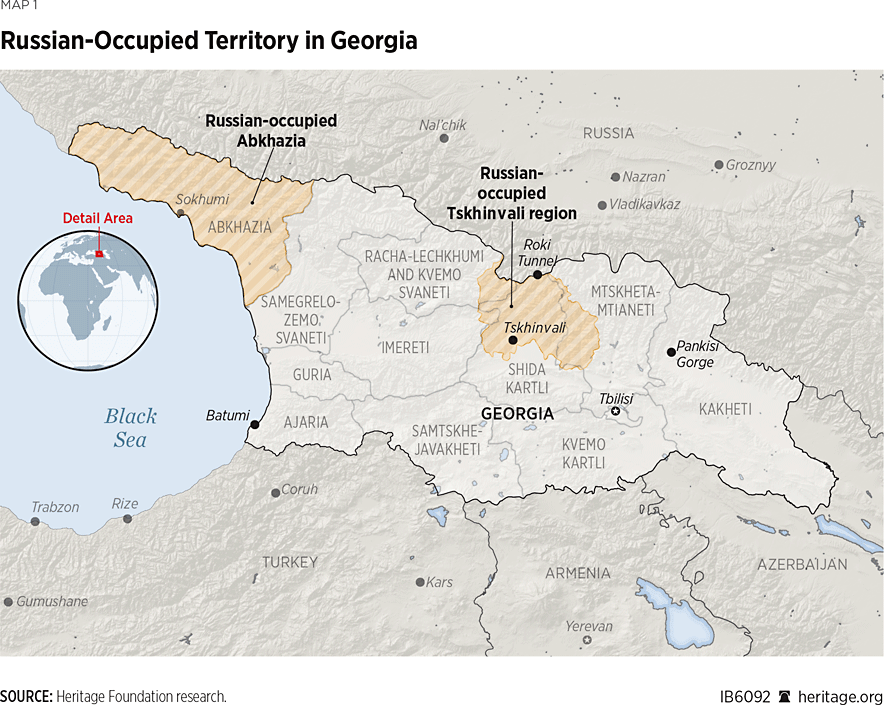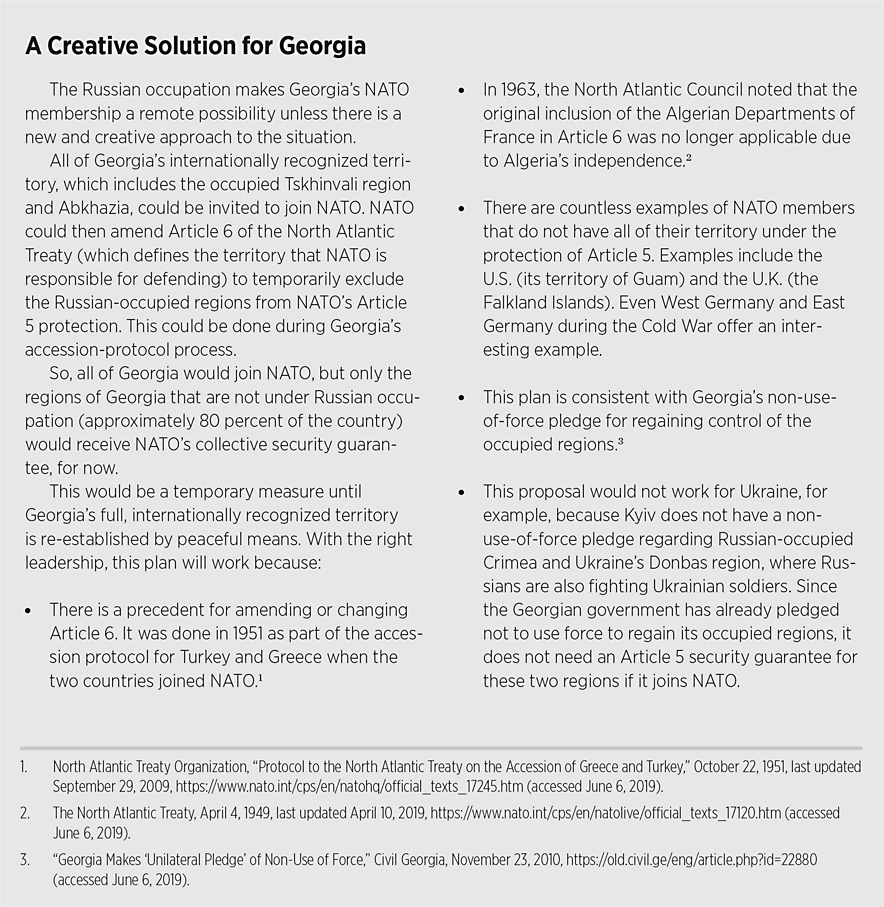The North Atlantic Treaty Organization (NATO) summit in Brussels on June 14, 2021, offers a chance for NATO allies to, firmly and finally, develop a reasonable and realistic path for Georgia to join the Alliance.
The U.S. should continue to support Georgia’s NATO aspirations and ensure that the summit delivers a capabilities package that will enhance the NATO–Georgian relationship while improving Georgia’s defensive military capabilities. The Alliance should live up to its 2008 promise and keep Georgia on track for NATO membership. Georgian NATO membership would bring more stability to the South Caucasus and transatlantic regions.
A Steadfast Partner
Georgia is a staunch partner of NATO. It is located in a dangerous and important geopolitical neighborhood for the Alliance. Georgians have proven themselves to be gallant in combat. They are also undertaking a defense transformation program that is an example to all of NATO. The reflection period provides the Alliance with a perfect opportunity to strengthen the relationship with Tbilisi and keep Georgia on the path toward membership.
After the Russian invasion of Georgia in 2008 and the subsequent occupation of 20 percent of its territory, Georgia has transformed its military and has been steadfast in its support of NATO as well as non-NATO U.S.-led overseas security operations. Georgia has contributed thousands of troops to Iraq and Afghanistan, and hundreds of peacekeepers to the Balkans and Africa. Even with the Russian invasion and its aftermath, Georgia has not been deterred from getting closer to the West. This has made Georgia a net contributor to transatlantic security.
Georgia is important to the Alliance for three main reasons:
- Georgia is a proven and dependable partner. This was especially the case in Iraq and Afghanistan. It is not well-known that, at the time of the 2008 Russian invasion, Georgia had the second-largest number of troops in Iraq after the U.S. In 2012, when many NATO countries were rushing for the door in Afghanistan, Georgia added hundreds of troops to the mission there. At the height of the Georgian contribution to Afghanistan, it had more than 2,000 troops serving in some of the deadliest places in the country, if not the world, in Helmand and Kandahar provinces.
- Georgia’s strategic location makes it important for NATO’s geopolitical objectives in the Caucasus and Black Sea region. Located in the South Caucasus, Georgia sits at a crucial geographical and cultural crossroads and has proven itself to be strategically important for military and economic reasons for centuries. Today, Georgia’s strategic location is just as important. For example, Georgia offered its territory, infrastructure, and logistic capabilities for the transit of NATO forces and cargo to Afghanistan. Over the years, Georgia has modernized key airports and port facilities in the country. This is particularly important when it comes to the Black Sea region. Key pipelines transit through Georgia, as do important rail lines. The oil and gas pipelines are particularly important to Europe’s energy security and therefore NATO’s interest in the region.
- Georgia’s journey to democracy is an example for the broader Eurasian region. Since regaining independence in 1991 after the collapse of the Soviet Union, Georgia has been on a journey to democracy. For the sake of regional stability, it is in NATO’s interest that Georgia remain on this path. Over the years, successive Georgian governments have pursued an agenda of liberalizing the economy, cutting bureaucracy, fighting corruption, and embracing democracy. Since the peaceful Rose Revolution in 2003, Georgia has been firmly committed to the transatlantic community.

Georgia’s Path to NATO
The NATO–Georgian relationship has never been closer, but more work remains to be done. Georgia was first promised eventual membership at the NATO summit in Bucharest in 2008. Since then, this commitment to membership has been reaffirmed at each subsequent NATO summit. Not all members of the Alliance have been as supportive as they could be. This is especially true of those NATO members that have an uncomfortably close relationship with Russia.
During the five most recent NATO summits, Georgia had hoped to receive a Membership Action Plan (MAP) but did not. The MAP is a NATO program that offers assistance and practical support tailored to the individual needs of countries wishing to join. MAPs were first used in 1999 for the Czech Republic, Hungary, and Poland, but there is no requirement for a candidate country to either receive or complete a MAP before joining the Alliance. Russia uses the repeated failure of Georgia to receive a MAP as a propaganda victory.
Even though Georgia has not received a MAP, it has a relationship with NATO that far exceeds the traditional MAP. The relationship includes the Annual National Program, the NATO–Georgia Commission, and the Substantial NATO–Georgia Package. The NATO–Georgia Joint Training and Evaluation Centre (JTEC) was opened in August 2015 in Georgia. Georgia also has twice contributed an infantry company to the NATO Response Force—quite a commitment for a country that is not a member of the Alliance. As NATO Secretary General Jens Stoltenberg said in December 2016: “Georgia has all the practical tools to become a member of NATO.”REF

Time to Act
Some NATO members are concerned that Georgia’s entry into NATO would trigger an automatic war with Russia over its occupation of the Tskhinvali regionREF and Abkhazia. Georgian officials privately say that they are happy to accept a NATO membership arrangement or compromise that excludes the two occupied territories from NATO’s Article 5 security guarantee until the matter is resolved peacefully with the Russians. (See Textbox 1.)
Keeping Georgia on its Euro-Atlantic path will require effort by the Alliance. It is important that NATO use the summit to recognize Georgia’s commitment and sacrifices to transatlantic security. To this end, NATO should use the Brussels Summit to:
- Ensure that each Alliance member is clear about supporting Georgia’s future membership. The summit declaration should make it clear that Georgia’s successful completion of subsequent Annual National Programs, the close relationship through the NATO–Georgia Commission, and the Substantial NATO–Georgia Package are the true markers of progress that will bring Georgia closer to membership.
- Think creatively about routes to membership. Georgia’s NATO limbo has lasted too long, and the Alliance must develop a demonstrable way forward for Georgian membership. Due to Russia’s partial occupation, most Europeans are lukewarm at best about Georgia joining NATO. At the summit, NATO members should informally discuss the possibility of amending Article 6 to temporarily exclude the occupied regions as a viable option that addresses concerns about war with Russia if Georgia joins NATO.
- Change the role of the MAP in Georgia’s NATO membership aspirations. At the Brussels Summit, NATO should omit the phrase “with MAP as an integral part of the process,” which has been used in the past five summit declarations, from the section about Georgia in the Brussels Summit declaration. This would allow the Alliance to have a real debate about the applicability and role of a MAP for Tbilisi.
- Ensure that a NATO–Georgia Commission meeting takes place at the heads-of-state or government level. In the past, the NATO–Georgia Commission met at the foreign-ministers level. This sends the wrong signal to the Georgian people. The NATO–Georgian Commission should be held at the heads-of-state or government level to demonstrate the seriousness with which NATO views its relationship with Georgia.
- Be sure to call the Russian military occupation an occupation in the reflection process report. NATO should refer to the unwanted presence of several thousand Russian troops in the Tskhinvali region and Abkhazia as what it is. To date, many European countries have failed to use this terminology. Given the events in Crimea and eastern Ukraine, it is more important than ever that NATO send a united and clear message.
- Invite Georgia to contribute troops to the U.S.-led multinational battalion in Poland as part of NATO’s Enhanced Forward Presence. Georgians are always looking for new ways to contribute to transatlantic security, and the U.S. and Georgia have a strong track record of serving alongside each other. As the Georgian presence in Afghanistan comes to an end, the U.S. should invite Georgia to contribute to its multinational battalion in Poland. To date, no non-NATO ally has contributed troops as part of the Enhanced Forward Presence initiative, but if Georgian troops are able to serve in the NATO Response Force, they should also be able to serve as part of the Enhanced Forward Presence.
Conclusion
Georgia is an important partner to the U.S. and NATO. It is located in a dangerous and important geopolitical neighborhood for NATO. Georgians have proven themselves to be gallant in combat. Georgia is also undertaking a defense transformation program that is an example to all of NATO. The Brussels Summit provides the Alliance with a perfect opportunity to strengthen the bilateral relationship with Tbilisi and keep Georgia on the path toward membership.
Luke Coffey is Director of the Douglas and Sarah Allison Center for Foreign Policy, of the Kathryn and Shelby Cullom Davis Institute for National Security and Foreign Policy, at The Heritage Foundation.


